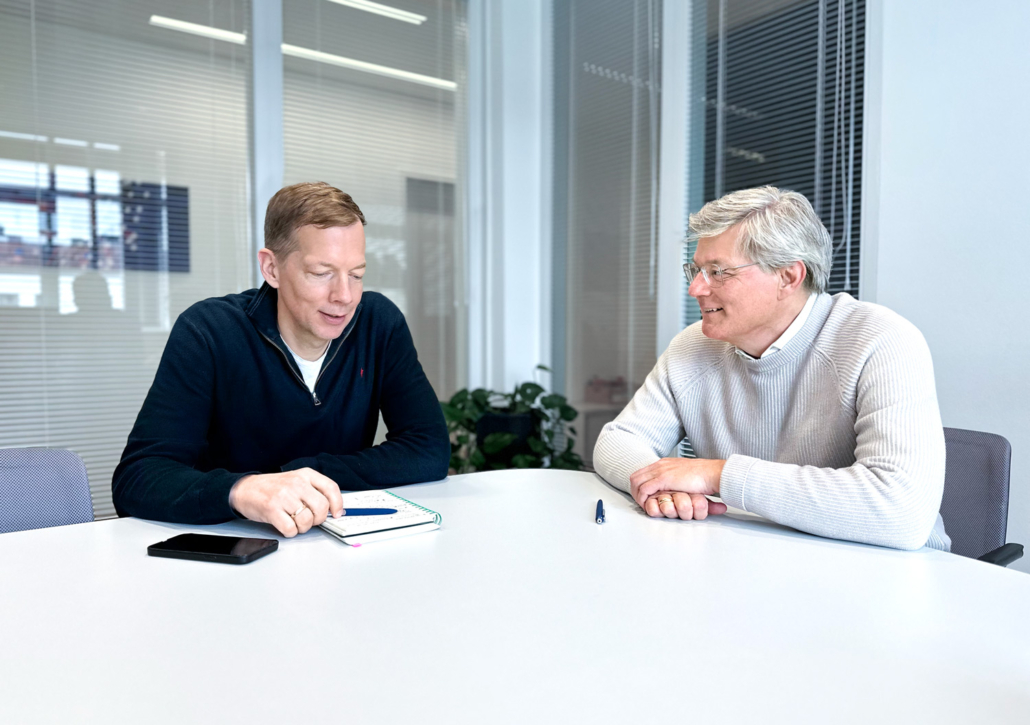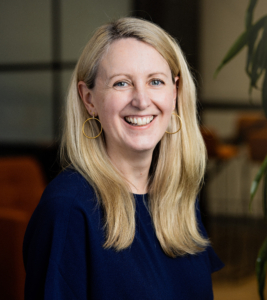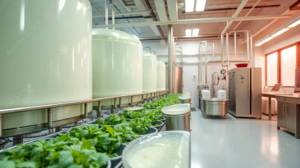
Unlocking the treasure trove
The Hamburg-based company Indivumed has repositioned itself, sending a clear message with a recent change in leadership: A new chapter is beginning with the focus on discovering and developing novel therapeutic targets for innovative cancer therapies. |transkript spoke with Prof. Dr. Hartmut Juhl and Dr. Matthias Evers.
|transkript: Prof. Juhl, we have spoken several times about the Indivumed biobank and its importance for the fundamental molecular research into cancer. Now, you’re making a fresh start, and are joining forces with Matthias Evers, who brings experience from McKinsey and Evotec. Where is this journey heading?
Hartmut Juhl: It’s a fresh start, yes, but not everything is completely new. Rather, it’s a logical progression. Matthias Evers’ decision to join us was the fitting decision because, at this point in our company’s history, we need someone who understands collaborative partnerships, has relationships with various pharmaceutical companies, but also the scientific understanding.
|transkript: Mr. Evers, you could be placed into many different boxes: McKinsey consulting, Evotec, systems integration at Just-Evotec Biologics – and always very digital. Are you the man for data or for partnerships?
Matthias Evers: I always wanted to learn something at each step of my career, and you always take something with you that you can use for the next step. At McKinsey, it was mainly about problem-solving, but working there also gave me the opportunity to build up an extremely large network, to understand different perspectives and learn how to approach complex issues. At Evotec, I was certainly very much an integrated operator. I bring a mixture of all these experiences to Indivumed. Here, we aim to drive the company’s business development forward together.
|transkript: What specifically motivated your move towards Indivumed?
Evers: What has driven me for years are platforms that enable a data-driven and knowledge-based understanding of diseases. That’s why I joined Evotec back then. If you take the topic of disease understanding and then look at the foundations Indivumed has established in cancer, you can see that we have a true prime example here. There is this publication that examines the high importance of standardised and rapid freezing of tissue samples and proves the crucial importance of a short ischemia time. Only under these conditions, when one can access such high-quality tissue samples, research has a chance to generate relevant, highly reliable (keyword: AI) human data. Cancer is such a broad disease area that I see it as a kind of common thread running through my CV – although I wouldn’t claim it was all meticulously planned. The exciting thing about my new job in commercial business development at Indivumed is the two areas that this encompasses: our own pipeline and the development of new collaborations.
|transkript: Mr. Juhl, how does this new Indivumed feel to you?
Juhl: Like a natural evolution. We’re no longer just generating data – we’re actively using it. In the early days, this was “raw data” in the form of tissue, then it became computer data in the form of multi-omics data. Now comes the next step: we use our data and develop new active ingredients, innovative therapeutics – either independently or in partnership with pharmaceutical companies, based on our data resource. This transformation has been underway for a year and a half, and in the past six months, we have accelerated it significantly. We have built up all the internal resources to extract value from the data. There’s the biomathematics and the analytics, the algorithms to connect the multi-omics profile with survival data and other clinical data. The laboratory capacity has grown to validate and biologically substantiate targets. Another very important component comes into play here. Not only do we continue to collect tissue samples, but we also transfer these tissue samples into organoid tissue cultures and primary cell cultures and thus have a very clinically relevant validation resource.
|transkript: So are you now doing everything in-house, with no more external lab partners?
Juhl: Not quite. We still work with Swiss company Biognosys for proteomics analyses – it’s simply an excellent high-throughput platform. Setting that up in-house would probably make little sense, just like building a sequencing high-throughput facility – others do that better. But relying on too many service providers means losing speed and control. That’s why we’ve continued to expand the areas we do best internally – scientific analytics, disease understanding, interpretation, identification and also validation within our own labs.
Evers: The data generation from the areas mentioned takes place externally, the interpretation, the testing of hypotheses, target identification and validation and thus the understanding of the disease in relation to the clinical data and phenotypes of the tissue-donating patients also via the organoid models – these are the differentiating capabilities of Indivumed. The laboratory capabilities of the very international and diverse team are one of the reasons why I am here and enjoy being here every day.
|transkript: How are you tackling the major challenges in the development of drugs against many forms of cancer? Although there is a huge pipeline in companies worldwide, progress is often only noticeable for small patient groups or often only very incremental.
Evers: The problem is that there are often no adequate models to understand patients in whom resistance develops or in whom the existing drugs do not work at all. Only gradually, more and more experts are following the lead of Hans Clevers from the Netherlands, who has set up an entire research institute for organoid models for Roche. Why? Because these organoid models are the only patient-relevant systems in which both the efficacy and safety of a drug can be tested. For that, you need primary patient tissue and the ability to build these models. Indivumed has both of these capabilities, and we are scaling them now. In this way, we are showing what modern cancer research can, and indeed must look like.
|transkript: So is developing your own drugs now the next step?
Evers: The clear progression is the shift from tissue to target molecule. Indivumed did not focus on this until recently. Research and data were generated in service cooperations, various analyses were carried out and tissue expertise was used. Only a few months ago were we able to develop our own pipeline from this. The results of several new target structures and approaches in colorectal cancer stem solely from these few months following the new business model. This is a statement in itself. We see the effectiveness of the new bi-specific antibodies, multi-specific antibodies, the ADCs and many new variations and approaches in the market. All aimed at common or even somewhat newer target molecules. Target molecules that allow more precise targeting of the tumour are always interesting, especially for differentiation. And this can then be combined with existing therapeutic developments or options, resulting in new, combined and synergistic efficacies.
|transkript: Speaking of financial resources: Do you have to limit yourself?
Juhl: Our starting point is the database, and access to clinics remain constant, which initially sets us apart from everyone else. And with this access – in terms of tumour entities – we can move in various directions. As our new pipeline now starts with colorectal cancer, it is already a broad entity and not a limitation. Beyond that, if there is interest, we can also tackle completely different tumours or even niche tumours.
|transkript: So that’s where Mr. Evers comes in as a matchmaker?
Evers: Partner matchmaking, yes, but it doesn’t have to be a marriage right away. We call it ‘co-creation’ because we strongly believe in collaborations on equal footing in order to successfully create new therapeutics. Such cooperation can start from scratch. Someone might want to build a pipeline in a very specific patient segment. In such a development collaboration, the financial resources come from the partner. The other aspect involves our own early assets. We maximise the potential of these assets by attracting the interest of a pharma partner. Our pipeline is young and very dynamic, so many additional assets will be added in a short time frame. Of course, the entire development process takes time, but I believe that all these types of partnerships also take a lot of time. I find it very exciting to be able to co-develop this.
|transkript: Times could be better for such partnerships, right?
Evers: We are realistic. The biotech market is in an extremely difficult phase. We need pharma, and anything that doesn’t fit to their strategic tableau is very difficult to sell at the moment. On the other hand, pharma always has its eyes and ears open. As soon as there is differentiating effectiveness in the relevant patient population, doors will open. We will need to increase our visibility, but we will also make intensive use of direct relationships and contacts and react to new situations. Pharmaceutical managers are also people with their own quirks and preferences, they change jobs, or their previous projects may unfortunately not have worked out. It takes a bit of luck to get into the right situation with your portfolio, but that’s also part of the magic when it finally clicks.
|transkript: Artificial intelligence – just a passing trend or already an absolute given in your labs?
Evers: The entire industry is about to take a fundamentally different approach to drug discovery. AI will play a central role. It’s not a trend, it’s here to stay and will only grow. It might still take ten years, but what AI absolutely needs are highly qualified data in the tissue context. We are well-positioned for this future of drug discovery because we have this foundation, even if not everything is yet fully AI-oriented — something very few have.
Juhl: We integrate AI tools as a matter of course; that is my understanding of the role of artificial intelligence. But the foundation is and remains the data sets. And we already have the crucial ones that differentiate us: proteins and, above all, phosphoproteins, which do not exist in this form in any other database.
|transkript: Circling back to funding – how do you see your financial position?
Juhl: We have secured our financing for several years through the sale of the service business and expect to reach profitability soon through the developing pharmaceutical partnerships. In addition to quality and innovation, efficiency is of utmost importance, also because it sets us apart from the pharmaceutical companies. I still think the ‘speedboat approach’ is the better option. Speed is the be-all and end-all in this biotech world at the moment.
|transkript: And the new Indivumed is this “speedboat”?
Juhl: Yes, at its core, this is now our mindset, that’s the important change. In 2023, with roughly 250 employees, we gave up the entire service area and with it the entire service mentality. That’s not a bad thing, just something different now: a specific focus on in-house scientific and commercial development. Currently, we have a staff of 80 employees . The core of this team was established back in 2018, when we decided to set up a second business unit. Then the database started to develop with the goal of discovering new therapeutic opportunities, initially in-silico.
|transkript: What do the current changes mean for you personally?
Juhl: For me personally, it is another step towards Indivumed’s original vision: to develop cancer therapeutics faster, more effectively and more precisely, enabling personalised therapy for patients. That’s why we’re doing all of this. We may not be there yet, but we are closer to the overall goal than ever before.



 Qureight Ltd
Qureight Ltd adobe.stock.com - Cathy
adobe.stock.com - Cathy